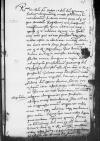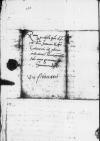Reverendissime in Christo Pater salut et Domine, domine gratiose.
Salutem obsequiorumque meorum plurimam commendationem.
cf. Johann REYNECK to Ioannes DANTISCUS 1534-12-01 — 1535-01-17, CIDTC IDL 7365, letter lost⌊Litterascf. Johann REYNECK to Ioannes DANTISCUS 1534-12-01 — 1535-01-17, CIDTC IDL 7365, letter lost⌋ meas, quas ad Gratiam Vestram per curatorem Rapthenii[1] mei Ioachimum novissimas ipsa hora abitus mei scripsi, spero Gratiae Vestrae redditas. Nunc, cum hominis mei noti, qui ad vos profi<ci>scitur atque istas reddet, copia se obtulerit, neutiquam illum ire sine meis sum passus, simul ut Gratiae Vestrae Reverendissimae significem, Vilnius (Wilno, Vilna), city in Lithuania, on the Vilnia river, capital of the Grand Duchy of Lithuania⌊hucVilnius (Wilno, Vilna), city in Lithuania, on the Vilnia river, capital of the Grand Duchy of Lithuania⌋ bona me superinscribed⌈meme superinscribed⌉ valetudine in regiam venisse, triduique hic facta mora, benigne a Sigismund I Jagiellon (Zygmunt I) (*1467 – †1548), King of Poland and Grand Duke of Lithuania (1506-1548); Duke of Głogów (Glogau) (1499-1506), Duke of Opava (1501-1506), Governor of Silesia (1504-1506); son of King Kazimierz IV Jagiellon and Elisabeth of Austria⌊regia maiestateSigismund I Jagiellon (Zygmunt I) (*1467 – †1548), King of Poland and Grand Duke of Lithuania (1506-1548); Duke of Głogów (Glogau) (1499-1506), Duke of Opava (1501-1506), Governor of Silesia (1504-1506); son of King Kazimierz IV Jagiellon and Elisabeth of Austria⌋ ad reliquam profectionem patrocin<i>o written over ii⌈iioo written over ii⌉ domini Nikolaus Nibschitz (Mikołaj Nipszyc) (*ca. 1483 – †1541), royal courtier, diplomat in the service of Sigismund I and Albrecht von Hohenzollern-Ansbach, Dantiscus' friend; from 1525 until his death an official representative of Duke Albrecht at the Cracow royal court; from 1532 royal secretary; 1519 royal envoy to Albrecht von Hohenzollern, Grand Master of the Teutonic Order, 1525, 1526 envoy to Hungary, 1527 envoy to the Congress in Wrocław, 1531-1533, 1537 envoy to Ferdinand I of Habsburg, 1535-1537, 1540 envoy to Brandenburg, 1536 envoy to the estates of Livonia⌊NipschitzNikolaus Nibschitz (Mikołaj Nipszyc) (*ca. 1483 – †1541), royal courtier, diplomat in the service of Sigismund I and Albrecht von Hohenzollern-Ansbach, Dantiscus' friend; from 1525 until his death an official representative of Duke Albrecht at the Cracow royal court; from 1532 royal secretary; 1519 royal envoy to Albrecht von Hohenzollern, Grand Master of the Teutonic Order, 1525, 1526 envoy to Hungary, 1527 envoy to the Congress in Wrocław, 1531-1533, 1537 envoy to Ferdinand I of Habsburg, 1535-1537, 1540 envoy to Brandenburg, 1536 envoy to the estates of Livonia⌋ dimissum esse. Quo autem Vestra Reverendissima Gratia perspectum habeat eam dimissionem, mitto exemplaria regiarum litterarum, quibus fultus bene spero divino favore me reliquum iter absoluturum rediturumque, si hiems, ut est intentior nunc, eodem aliquamdiu on the margin⌈aliquamdiualiquamdiu on the margin⌉ algore obriguerit, qua proficiscor, alioqui mari traiecturus. Ita enim ratio negotiorum meorum urget, ut velis una remisque adnitar atque accelerem pro reditu.
Nova hic sunt nulla digna, quae scribam. His me gratiae, favori et benevolentiae domini mei ex animo commendo.
Servet Deus Gratiam Vestram Reverendissimam omnesque nostros.


 BCz, 243, p. 158
BCz, 243, p. 158